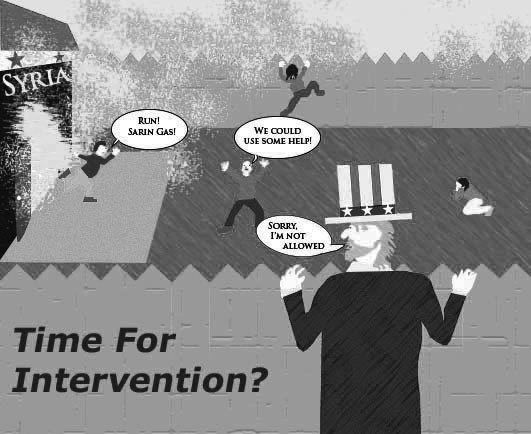EDITORIAL: Obama’s Speech Shows Strong Leadership

The photograph is haunting. A young girl lies on the floor with her face turned one way and her knee pointing the other.
It’s a position only a child could sleep in comfortably. Her polka-dotted pants are well-worn, the Hello Kitty t-shirt less so, and the vacant space around her compared to the crowd of the room could indicate a restless sleeper.
For just a second, it’s easy to believe a happier truth. It’s simple to pretend she’ll wake up in the morning.
The devastating truth is in black and white below the photograph. A chemical attack on a Syrian suburb in August lead to nearly 1500 estimated casualties, including more than 400 children.
Response to the atrocity was loud and left the world waiting on a reaction.
Within days after the attack, the international community fell into a gridlock of pointed fingers. More than two weeks after the CIA verified the use of chemical weapons, the gridlock stands.
The United States government claims to hold proof Syrian president Bashar al-Assad authorized the attack. President Barack Obama called for swift action from the international community.
The group responsible for making a decision, the U.N. Security Council, was stuck. Two permanent members, Russia and China, considered President Obama’s call to action an act of aggression.
With the U.N. at a standstill, eyes are turned toward the U.S. to make a move. The American president cited our responsibility to do so, declaring a “red line” has been crossed.
There are, in fact, guidelines in place, agreed on by the international community, for foreign intervention in domestic affairs.
Two chapters of a report titled “Responsibility to Protect” were included in the 2005 World Summit Outcome Document. These chapters acknowledge the international responsibility to protect human life but state that the individual nation holds primary responsibility.
Only when a nation fails or refuses to protect its own should the international community intervene.
Chapter 7 of the Charter of the United Nations explains the policy for intervening in domestic issues and states that diplomatic options will always be considered before military intervention, specifically between member nations. The U.S. and Syria are both member nations.
It is a clear reminder that the U.N. was established in an effort to promote peace between nations and peace remains its primary goal.
If it is proven that the Assad government is responsible for the chemical attacks, the responsibility will fall on the international community to protect Syrian citizens.
A failure to wait on results from the U.N. investigation and a determination to sidestep the Security Council would make the U.S. look more like a vigilante nation than world police.
The anger and pain of the tragedy is understood. The heartache comes through clearly with each photograph. The loss of that many innocent lives hurts the world as a whole.
The desire to punish isn’t being debated. The method of punishment is.
The responsibility to protect lies primarily at home.
What about this community, the small but busy one resting in the middle of NASA, Houston, and the oil refineries? What about the national community?
The U.S. has been warned by Syria and its supporters not to strike without U.N. support.
It’s always a little bit easier in September to remember that threats against the U.S. aren’t as vague and distant as we once thought.
The events of 9/11 taught us a painful lesson. We realized we weren’t invincible.
As a nation, we mourned. We didn’t hesitate to support retaliation.
In the 12 years since that day, we’ve learned the value of restraint.
The weapons of mass destruction debacle in Iraq should have taught us that.
The U.S. should react quickly to clear and immediate threats to national security. It should intervene in foreign politics when necessary, with the support of the international community it helped build and according to the guidelines it helped write.
When President Obama addressed the nation last week, he showed humility, restraint and a willingness to listen. Some will call him weak. Not true. It takes a strong leader to put principle ahead of pride and seek diplomacy over war when lives are in the balance.


EDITORIAL: Obama’s Speech Shows Strong Leadership http://t.co/6n2MYv8IqD